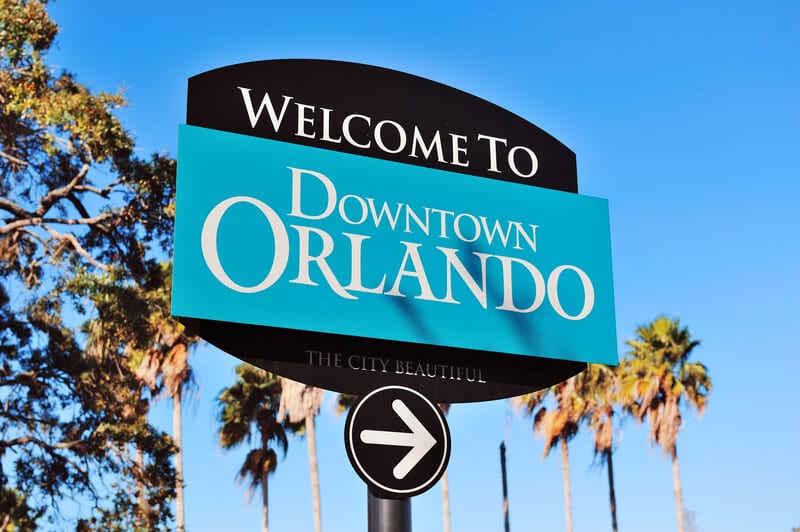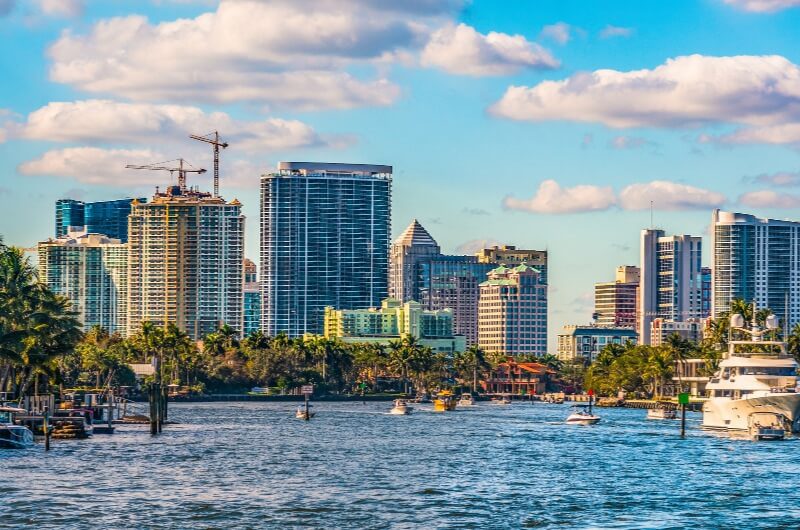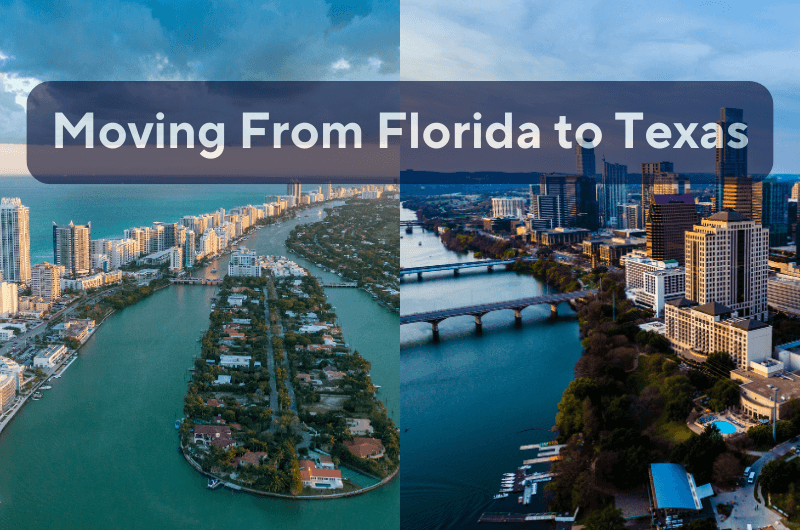It’s a big decision to move to Orlando, but it can also be an exciting one. Everyone can find something to do in the dynamic and diversified city of Orlando.
Orlando has everything, whether you’re seeking fun for the whole family, top-notch entertainment as a single man or woman, or just a stunning location to live.
The following information is essential if you’re considering moving to Orlando, including some all-important moving tips!
Orlando: An Overview
Florida is known as a magnet for retirees and part-time snowbird residents, but Orlando bursts that stereotype. With its youthful median age of only 34 years, Orlando stands apart as one of Florida’s most demographically young and vibrant cities.
This fountain-of-youth vibe stems from Orlando’s many colleges and universities, which draw in students from across the country.
The city also provides plenty of job opportunities spanning numerous industries, from aerospace and tech to healthcare and hospitality. Professionals in these industries can build thriving careers in this city.
Families are attracted to Orlando’s sunny lifestyle, amenities, schools, and family-friendly attractions. While some Florida cities skew older, Orlando retains a median age on par with many other major metro areas.
Both small businesses and major corporations find Orlando’s workforce, infrastructure, and business climate beneficial.
This perfect storm of higher education, steady jobs, and quality of life makes Orlando an enticing locale for residents, young and old alike.
Why Move to Orlando?
- Favorable weather conditions: One of Orlando’s biggest appeals is the chance to enjoy near-constant sunshine all year long. Though evenings and winter months see cooler temperatures, true cold weather is rare in Orlando.
- Boasts a hot real estate market: With home values rising annually, this is a great time to purchase real estate in the Orlando region.
- The cost of living: Despite the great demand for it real estate, the cost of living in the city is surprisingly low.
- The Job Market: A wide range of industries, including tourism, hospitality, healthcare, and technology, are represented in Orlando’s competitive labor market.
- Things to do: It’s difficult to become bored in Orlando! It is a well-liked tourist destination since it’s home to renowned theme parks like Walt Disney World and Universal Studios.
- Beautiful surroundings: Orlando is a sizable city, but despite this, you’ll never feel alienated from nature if you live here.
- Ability to travel: The 10th busiest airport in the US, Orlando International Airport, is located in Orlando. You’ll be able to travel nationally or internationally quite easily.
How Much Does it Cost to Move to Orlando?
While Orlando offers a lower-than-average cost of living, relocating there still carries expenses, especially when it comes to hiring movers.
Fortunately, the average cost to hire movers in Orlando range from $1,390 for an in-town move to $3,922 for a long-distance relocation.
Understanding these typical price points can help you budget and find long distance movers within your means. While moving always requires cash outlay upfront, Orlando’s favorable costs stretch your dollar further.
Factor Orlando’s lower living costs into your moving budget. Weigh options like DIY packing, renting a truck, buying your own moving boxes, or downsizing possessions to save on the move. Get a few moving quotes from moving companies before hiring one for your move.
What Are the Pros and Cons of Moving to Orlando?
Pros of Moving to Orlando
1. Central Location
Orlando is located in the center of Florida and due to this central location, it’s home to one of the busiest and largest airports, Orlando International Airport.
2. Elegant Neighborhoods
Orlando boasts many prime locations that combine convenience with charm. The College Park neighborhood provides easy access to local shops and acclaimed eateries in the city.
For those fascinated by architectural history, the Lake Eola Heights Historic District showcases an array of styles from Art Deco flair to Mediterranean revival grace.
3. Extensive Attractions
There are a ton of intriguing places in this city that both locals and visitors like visiting.
4. Excellent Job Market
The local economy has benefited from tourism, particularly the accommodation and restaurant sectors. Among the biggest employers in the region are local hospitals, Lockheed Martin, Disney World, and Universal Studios.
5. There is no State Tax
You will save a lot of money on state taxes if you decide to relocate to Orlando. Depending on your job, eliminating state income taxes could result in thousands of dollars in savings.
Cons of Moving to Orlando
1. Frequent Hurricanes
Orlando’s location means it is often impacted by strong hurricane seasons. Severe weather events are a regular occurrence.
2. Large Influxes of Tourists
Orlando sees huge numbers of visitors from around the world flocking to its many attractions. This influx of tourists can make life difficult for residents, with increased traffic, crowds, and long lines.
3. Vast Urban Expansion
The metro area sprawls over a large geographic area, making driving sometimes long and congestion a constant frustration. Public transit only reaches so far in this expansive city.
What is the Cost of Living in Orlando?
According to recent data, Orlando’s overall cost of living index sits around 1% under the national average. This means your dollar will stretch a bit further when it comes to covering your basic needs. Specifically, housing, utilities, and healthcare in Orlando ring in around 4-5% cheaper compared to national benchmarks. These savings are excellent news if you’re relocating from a more expensive metro area.
However, it’s not all sunshine and savings when it comes to Orlando’s cost of living. Key expenses like transportation and groceries cost more than the typical US city, to the tune of 1-6% above average. At the pump and checkout line, be prepared to shell out a bit more from your wallet.
To put firm numbers on it, a family of four in Orlando requires approximately $3,400 per month to cover necessities before accounting for housing. A single individual can expect to spend just under $1,000 on basic monthly expenses minus rent/mortgage.
On that note, Orlando’s rental rates have quite a range depending on factors like location and size.
It’s important to remember Florida’s rental market is fast-moving, so these numbers fluctuate.
In summary, Orlando offers a moderately affordable cost of living, with savings on housing but premiums on transportation and food. Do your homework to budget wisely for your situation. Expenses are trending upwards nationwide, so factor that in as well.
What Are the Best Neighborhoods to Live in Orlando?
If you’re considering moving to Orlando, the city offers diverse neighborhoods suitable for different lifestyles and interests. When choosing where to live, your age and priorities will steer you toward certain areas over others.
To help find the optimal community, let’s explore some of Orlando’s best neighborhoods for different residents.
1. Lake Nona
Lake Nona is a new planned community focused on wellness and technology, with amenities like a large tennis facility, medical research hub, and a Chopra-designed yoga studio. It offers a modern, innovative vibe.
2. South Eola District
The South Eola District provides an urban lifestyle. Historic homes mix with modern high-rises, and the area has an active social scene and arts culture.
3. Winter Garden
Winter Garden retains its small-town charm and citrus heritage, with downtown on Plant Street lined with boutiques and restaurants in historic buildings. It appeals to both young and older residents alike.
4. Windermere
Windermere is both a sleepy lakeside village with deep local roots and a fast-growing suburb dubbed “Winder-near.” It offers a range of housing options and a strong community spirit.
5. Winter Park
Winter Park has an upscale New England-style vibe, with wealthy residents and cultural attractions. Its downtown Park Avenue and Rollins College campus are focal points, but it offers diverse housing.
How is the Job Market in Orlando?
Orlando boasts a robust job market spanning various industries like tourism, healthcare, and technology. Major employers such as Disney, Universal, and SeaWorld are based here, along with numerous smaller businesses and startups.
With unemployment below the national rate at 3.5%, there are currently more available jobs than job seekers in Orlando. Further growth is expected, likely yielding even more opportunities. Some of the most in-demand roles include software engineers, nurses, customer service reps, salespeople, food service workers, hotel staff, and theme park employees.
For those considering a move to Orlando for work, research is key. Make sure your skills align with openings by checking online job boards and reaching out to local companies. With the right qualifications, Orlando offers plenty of job options across diverse fields.
What is Orlando Most Known for?
1. Theme Parks
Orlando is world-renowned as a theme park destination, home to giants like Walt Disney World and Universal Orlando Resort. Disney’s Magic Kingdom pioneered the concept of themed lands and rides bringing movies to life.
Universal Studios offers immersive worlds from Harry Potter, Jurassic Park, and more. Beyond the major players, Orlando has other amusement park attractions like Legoland and SeaWorld.
2. Entertainment
Apart from rides and characters, its International Drive is packed with museums, restaurants, shops, and entertainment. It’s also known for its thrilling nightlife scene, from comedy clubs to dance spots and live music venues.
3. Weather
The city is infamous for its unpredictable weather, especially the fast-forming thunderstorms that frequently soak the area during summer afternoons. Year-round sunshine quickly gives way to sheets of rain.
4. Scenery
Natural features like lakes and springs provide recreation, while world-class golf courses offer leisure. Proximity to parks and preserves provides easy access to nature.
In summary, Orlando has cemented its status as both a theme park mecca and a well-rounded city with diverse entertainment, weather quirks, and natural beauty.
What Are the Best Schools and Universities in Orlando?
1. The University of Central Florida
The University of Central Florida (UCF) is Orlando’s largest school with over 60,000 students. As one of the nation’s biggest universities, UCF provides an extensive alumni network and over 240 academic programs. It offers a classic big school experience with Division 1 athletics and an active social scene.
2. Rollins College
For a more intimate liberal arts education, Rollins College enrolls just over 2,000 students. Its beautiful lakefront campus promotes hands-on learning in small classes. Rollins focuses on interdisciplinary academics and close student-faculty interactions.
3. Stetson University
Stetson University is a mid-sized private college with around 4,000 students. Its historic campus includes lush courtyards and lawns. Stetson offers about 100 majors and minors, strong athletics, and abundant student activities through over 140 clubs.
Is Moving to Orlando Worth It?
With its beautiful scenery, sunny weather, and world-famous attractions, it’s no wonder Orlando attracts thousands of new residents every year. Orlando is an ideal spot for those looking to relocate as it’s one of the fastest-growing cities in the U.S. Orlando offers newcomers endless amenities paired with warm weather year-round.
With steady growth projected, the city provides the perfect backdrop for both seizing opportunities and enjoying a high quality of life. Get your packing checklist ready!






